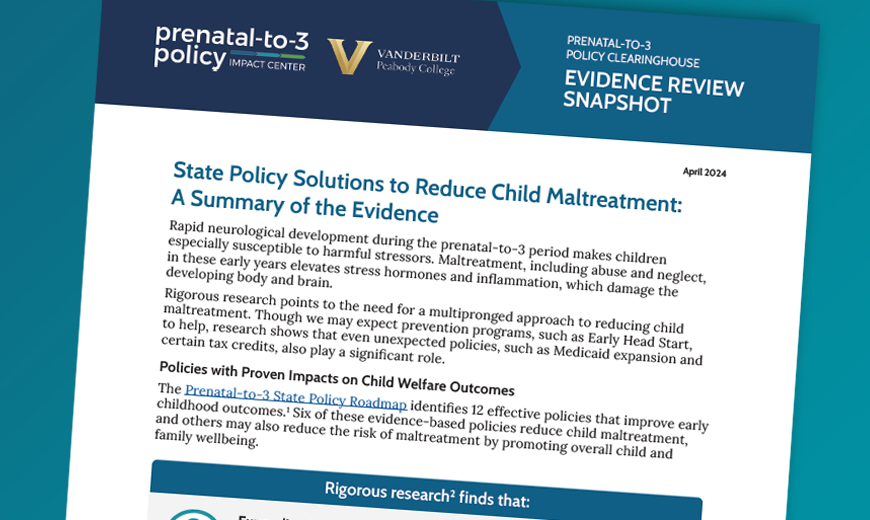A Summary of the 2021 Act’s Benefits for Infants and Toddlers
Tuesday, March 30, 2021, 12:00 – 1:30 pm CT | Recording and Materials Below
Signed into law on March 11, 2021, the American Rescue Plan Act of 2021 broadens states’ flexibility to effectively support children and families and build a comprehensive prenatal-to-3 system of care. The $1.9 trillion stimulus bill has major implications for the prenatal-to-3 period because it expands eligibility for programs, increases the value and refundability of tax credits for families, and provides substantial funding increases to public programs serving families and caregivers.
A new resource, How Will the American Rescue Plan Strengthen the Prenatal-to-3 System of Care? A Summary of the 2021 Act’s Benefits for Infants and Toddlers, provides an easy-to-read digest of the many provisions related to policies and strategies that have implications for the prenatal-to-3 period.
In this related webinar, Prenatal-to-3 Policy Impact Center director Dr. Cynthia Osborne hosted an timely discussion with Dr. Greg Duncan, chair of the National Academies of Sciences, Engineering and Medicine’s Committee on Building an Agenda to Reduce the Number of Children in Poverty by Half in 10 Years. They discussed the American Rescue Plan, its impact on infants and toddlers, and what it means for state policymakers. Scheduled speaker Denise Forte, Senior Vice President for Partnership and Engagement at The Education Trust, was unfortunately unable to participate. Recording and materials are provided below.
Watch the Recording
Webinar Materials
- Webinar slide deck (PDF)
- See the live tweets on Twitter at @pn3policy and #pn3policy
- Prenatal-to-3 Policy Impact Center
- Brief/Guide: How Will the American Rescue Plan Strengthen the Prenatal-to-3 System of Care? A Summary of the 2021 Act’s Benefits for Infants and Toddlers (PDF)
- Brief: Why Do We Focus on the Prenatal-to-3 Age Period?: Understanding the Importance of the Earliest Years
- Prenatal-to-3 State Policy Roadmap and State Roadmaps
- Additional resources
- National Academies of Sciences, Engineering, and Medicine’s report on reducing child poverty
- The American Rescue Plan’s 12-month postpartum Medicaid coverage option: Kaiser Family Foundation; Georgetown Center for Children and Families
- The Center on Poverty & Social Policy brief on the potential poverty reduction effect of the American Rescue Plan
- About Baby’s First Years, the first causal study to test the connections between poverty reduction and brain development among very young children
About the Speakers
GREG DUNCAN, PH.D. is a Distinguished Professor in the Department of Education at the University of California, Irvine and an adjunct faculty member at the Institute for Policy Research at Northwestern University. He was the Chair of the National Academy of Sciences, Engineering, and Medicine Committee on Building an Agenda to Reduce the Number of Children in Poverty by Half in 10 Years and served as president of both the Population Association of American and the Society for Research in Child Development. His research has highlighted the importance of early childhood as a sensitive period for the damaging influences of economic deprivation as well as for the beneficial impacts of policy-induced income increases for working families. His more recent research focuses on understanding the relative importance of early academic skills, cognitive and emotional self-regulation, and health in promoting children’s eventual success in school and the labor market. Duncan holds a Ph.D. in Economics from the University of Michigan.
DENISE FORTE is the Senior Vice President for Partnership and Engagement at The Education Trust where she leads Ed Trust’s legislative efforts and coordinates the organization-wide advocacy agenda and strategy. Prior to Ed Trust, she was a Senior Fellow and Director of Public Affairs for The Century Foundation and also spent 20 years in progressively senior congressional staff roles. Forte also served in the Obama administration at the U.S. Department of Education, where she held the positions of Principal Deputy Assistant Secretary and Acting Assistant Secretary in the Office of Planning, Evaluation and Policy Development. She has worked in the nonprofit leadership development space as the Vice President for Policy Leadership at Leadership for Educational Equity, an organization supporting current and former teachers in public leadership. In each of these roles, she has worked to promote and advance policies that prioritize educational equity for those children who are historically underserved. Forte holds a B.S. in Computer Science from Duke University and a M.A. in Women’s Studies from George Washington University.
CYNTHIA OSBORNE, PH.D. is the Founder and Director of the Child and Family Research Partnership and leads its national Prenatal-to-3 Policy Impact Center. She is also Associate Dean for Academic Strategies of the LBJ School of Public Affairs at The University of Texas at Austin. Osborne was an appointed member of the National Academies of Sciences, Engineering, and Medicine (NASEM) Committee on Building an Agenda to Reduce the Number of Children in Poverty by Half in 10 Years and is currently serving on another NASEM committee, Exploring the Opportunity Gap for Young Children Birth through Age 8. Osborne’s teaching and research interests are in the areas of social policy, poverty and inequality, family and child wellbeing, and family demography. She has extensive experience leading long-term evaluations of state and national programs, with the aim of helping agencies and organizations understand what works, and how to ensure sustainable implementation of effective policies. Osborne holds a Ph.D. in Demography and Public Affairs from Princeton University and a Master in Public Policy from Harvard’s Kennedy School of Government.
Please contact us if you have questions about the webinar.



